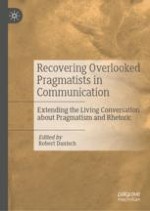2019 | OriginalPaper | Buchkapitel
2. Richard McKeon in the Pragmatist Tradition
verfasst von : Peter Simonson
Erschienen in: Recovering Overlooked Pragmatists in Communication
Aktivieren Sie unsere intelligente Suche, um passende Fachinhalte oder Patente zu finden.
Wählen Sie Textabschnitte aus um mit Künstlicher Intelligenz passenden Patente zu finden. powered by
Markieren Sie Textabschnitte, um KI-gestützt weitere passende Inhalte zu finden. powered by
